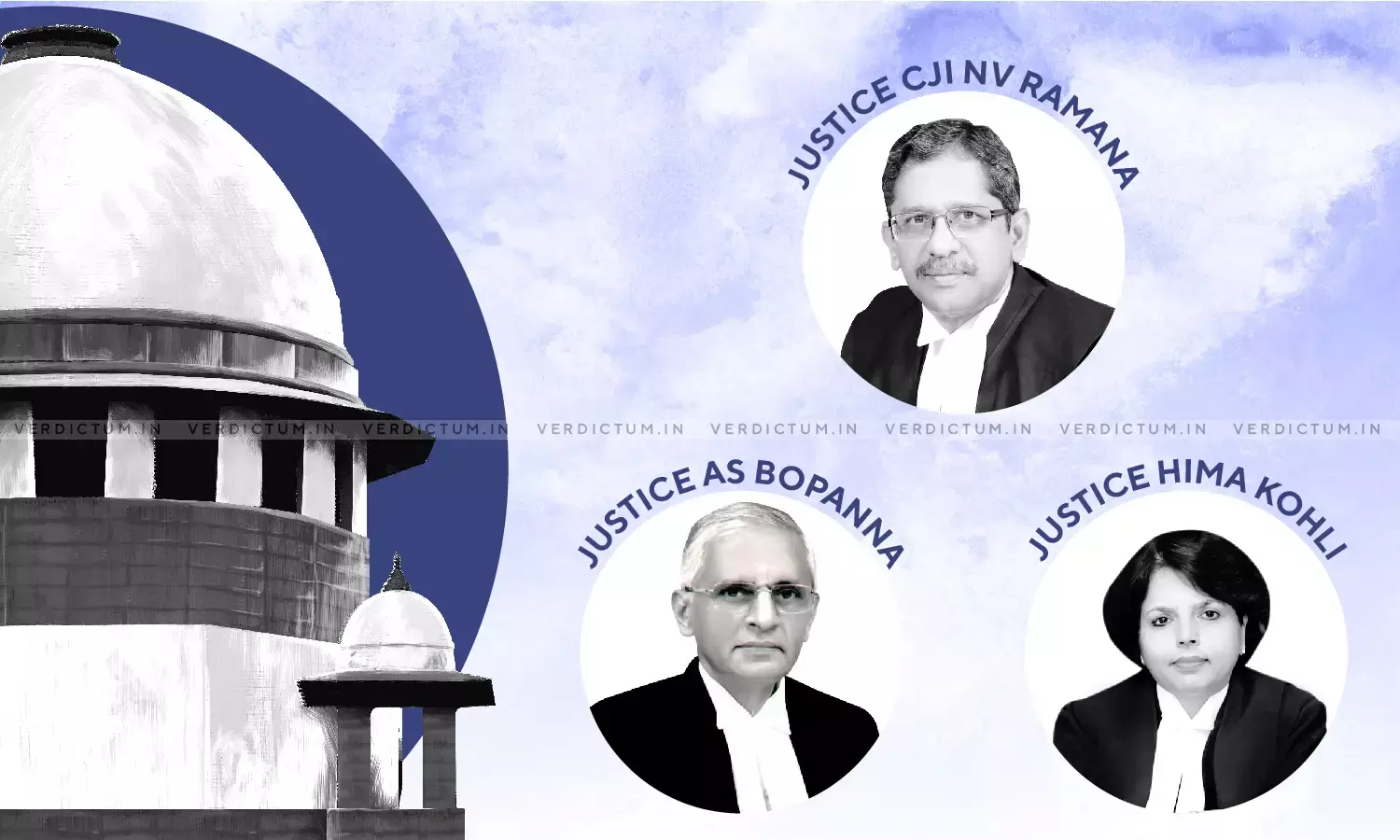Demand Of Money For Construction Of A House Would Fall Within The Definition Of Dowry: Supreme Court

A three-judge bench of CJI N.V. Ramana, Justice A.S. Bopanna and Justice Hima Kohli has held that the High Court fell into an error by holding that the demand of money for the construction of a house cannot be treated as a dowry demand.
Mr Prashant Singh, Advocate General appeared for the Appellant-State while Counsel Mr Anish Kumar Gupta appeared on behalf of the Respondents.
The appeal was preferred by the State being aggrieved of the judgment of Madhya Pradesh High Court, via which, the judgment of conviction and sentence imposed by ASJ on Respondent no. 1 and 2 was set aside under Sections 304-B and 306 IPC while maintaining the conviction of Respondent no. 1 under Section 498-A and reducing the sentence from 3 years to period already undergone but setting aside conviction and sentence on Respondent no. 2 even under Section 498-A.
The Court found that during the extensive cross-examination, PW1 had firmly stuck to his statements that the harassment of Geeta Bai, i.e., his niece, had started within 6 months of her wedding with Respondent no. 1 who had asked for Rs. 20,000 from her mother and PW1 for construction of a house.
The Court, then, observed that the most fundamental constituent for attracting the provisions of 304-B IPC is that the death of the woman must be a dowry death. The Court noted -
"Four pre-requisites for convicting an accused for the offence punishable under Section 304-B are as follows:
(i) that the death of a woman must have been caused by burns or bodily injury or occurred otherwise than under normal circumstance;
(ii) that such a death must have occurred within a period of seven years of her marriage;
(iii) that the woman must have been subjected to cruelty or harassment at the hands of her husband, soon before her death; and
(iv) that such a cruelty or harassment must have been for or related to any demand for dowry."
The Court then placed reliance on Rajinder Singh vs. State of Punjab, (2015) 6 SCC 477 wherein Section 2 of the Dowry Act was split into six distinct parts for a better understanding of the said provision, that were extracted hereafter.
"8. A perusal of Section 2 shows that this definition can be broken into six distinct parts:
(1) Dowry must first consist of any property or valuable security— the word "any" is a word of width and would, therefore, include within it property and valuable security of any kind whatsoever.
(2) Such property or security can be given or even agreed to be given. The actual giving of such property or security is, therefore, not necessary.
(3) Such property or security can be given or agreed to be given either directly or indirectly.
(4) Such giving or agreeing to give can again be not only by one party to a marriage to the other but also by the parents of either party or by any other person to either party to the marriage or to any other person. It will be noticed that this clause again widens the reach of the Act insofar as those guilty of committing the offence of giving or receiving dowry is concerned.
(5) Such giving or agreeing to give can be at any time. It can be at, before, or at any time after the marriage. Thus, it can be many years after a marriage is solemnised.
(6) Such giving or receiving must be in connection with the marriage of the parties. Obviously, the expression "in connection with" would in the context of the social evil sought to be tackled by the Dowry Prohibition Act mean "in relation with" or "relating to"."
The Court noted that the view in Appasaheb v. State of Maharashtra, (2007) 9 SCC 721 was not subscribed to in Rajinder Singh's Case (Supra) wherein it was held that Appasaheb's Case does not state the law correctly.
The Court, in Rajinder Singh's Case (Supra), had opined that the fact that Section 304-B was inserted in IPC to combat the social evil of dowry demand that has reached alarming proportions, it cannot be argued that in case of an ambiguity in the language, same ought to be construed strictly as that would amount to defeating the very object of the provision.
The Court noted, "Interpretation of a provision of law that will defeat the very intention of the legislature must be shunned in favour of an interpretation that will promote the object sought to be achieved through the legislation meant to uproot a social evil like dowry demand."
Considering the evidence on record, the Court came to the conclusion that the analysis of the trial court was correct and Respondents deserve to be convicted under Section 304-B and 498-A IPC. However, the Court did not disturb the findings of the High Court wherein it had acquitted the Respondents for the offence under 306 IPC.
The Court also proceeded to hold that the sentence imposed by the Trial Court on Respondents of rigorous punishment for life be reduced to rigorous punishment for seven years, which is the minimum sentence prescribed for an offence under Section 304-B IPC.
Click here to read/download the Judgment

